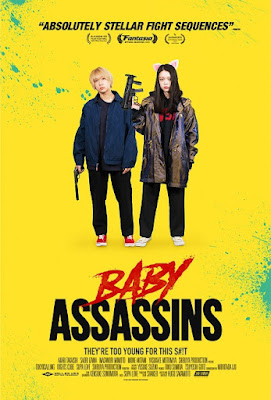Which
is a greater menace to society, the Yakuza or independent filmmakers? It hardly
matters, because when they join forces, there will be blood on the floor. We
are talking wall-to-wall pooling here. Yes, this is a Sion Sono joint, so get
your game face on when Why Don’t You Play
in Hell? (trailer
here) opens
in New York.
Ten
years ago, scruffy would be teen filmmaker Hirata Don and his two
camera-operating chums first met Sasaki, their supposed martial arts star. On
that fateful day, they also crossed paths with Jun Ikegami, a profusely bleeding
yakuza. He was supposed to assassinate Taizo Muto, a rival clan leader, but Ikegami
and his accomplices ran into Muto’s wife Shizue instead. Only Ikegami survives
her wrath, but not before getting a severe dressing-down from her ten year old
daughter, Michiko.
Michiko
had been well on her way to being Japan’s sweetheart, based on her perversely
catchy TV toothpaste commercial jingle, but her mother’s murder convictions
derail her career. Feeling understandably indebted to his wife, Muto promises
to establish their daughter in the movies before her release. However, the now
punky and petulant Michiko walked away from her legit film debut, forcing the
studio to recast. With mere days left before Shizue’s parole, Muto needs to
find a production for Michiko fast. You see where this is going? Eventually,
Don’s dubious crew will hook up with Muto’s clan, but everyone thinks the
director is Koji Hashimoto, a poor schmuck on the street Michiko roped into her
madness.
With
no time to write a proper script, Don opts to film Muto’s war with Ikegama
verite-style. Buckle up, because there is going to be a body count. When it
comes to over-the-top, outrageously gory comedic violence, Sono’s latest film
stands tall, in a field all its own. The sheer level of mayhem Sono unleashes
in the third act would even leave Itchy & Scratchy slack-jawed. It is
impressive.

Amid
all the carnage, there is also something of a valentine to filmmaking and an
affectionate eulogy for old school 35mm. It also features one of the greatest
and fiercest performances by a child actor, maybe ever, but it will probably be
a good eight or ten years before Hara Nanoka’s parents let her see her work as
young Michiko. As the older Michiko, NYAFF Rising Star Award winner Fumi
Nikaido smoothly picks up the baton and proceeds to bash just about everyone
with it. It is a butt-kicking star turn, but nobody can out hard-nose Jun
Kunimura (Boss Tanaka in Kill Bill vol. 1,
which seems so tame in comparison) as the steely but devoted Muto.
On
the Sion Sono spectrum, this is more polished than Bad Film, but more ragged around the edges than Love Exposure. Regardless, whatever you
think WDYPIH is, raise it to a power
of ten. Highly recommended for cult film connoisseurs who have a general idea
what they are getting into, Why Don’t You
Play in Hell? opens this Friday (11/7) at the Yonkers Alamo Drafthouse and
screens late nights this weekend at the IFC Center.

































